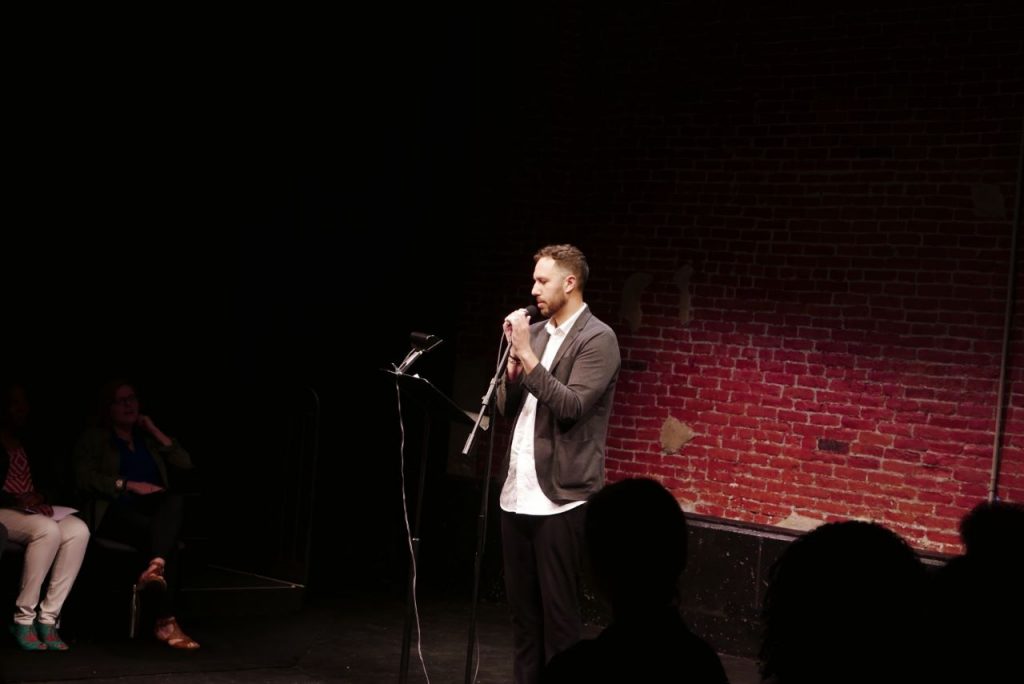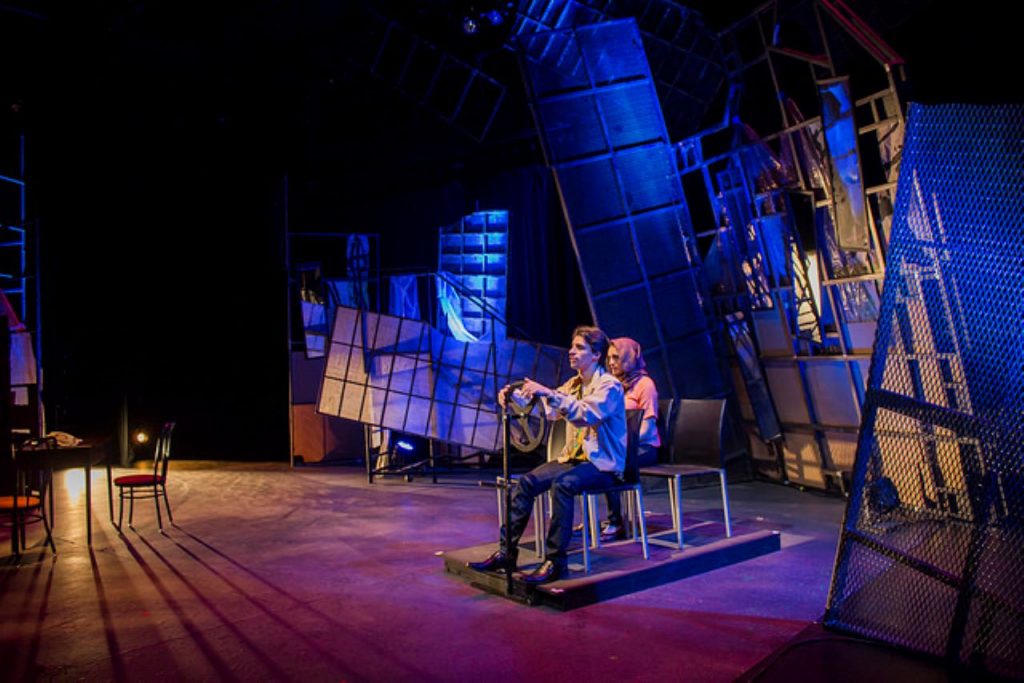BY MAX MCGUIRE ’24

Click here to go to Eric’s website
Eric Micha Holmes, the theater department’s Visiting Lecturer In Playwriting who taught “Introduction to Playwriting” this past semester, wears many hats: the hat of playwright, dramaturg, author, editor, and performer. After graduating with a BA from Arizona State College, and obtaining his MFA from Iowa State University, Holmes has gone on to work for Audible, BBC4, The National Black Theatre, The Apollo Theatre, and of course, Skidmore College, to name a few. Upon interviewing Holmes for this very newsletter article, he left me with a sentiment that I will forever hold dear upon graduating in three weeks- It doesn’t matter where you went to school or the number of jobs you worked. What truly counts are the individuals you meet along the way, for they are what make a life in the arts authentic.
Max: I always start my faculty highlight interviews by asking how you got into theater. How did you know that this is something you wanted to do? How did you know that you wanted to do playwriting?
Eric: Growing up, my only natural talent was for drawing, but I was also interested in music, dance, and every other form of creativity. So maybe that’s why I ended up in the theater because it’s the most spongy and refractive art. Playwriting is literature; it’s psychology, it’s history, it’s philosophy, it’s dance, it’s music, it’s everything. So maybe the reason theater stuck is because it allowed me to engage with all of them.
Max: What inspires you to write and create? What parts of yourself do you bring to your writing?
Eric: Like many who show an interest in theatre, I started off acting. But real actors, at least the ones I admire, were able to process everything that was going on inside them through the roles they created. Playwriting did that for me. I tried other forms of writing, and I think what distinguished my playwriting from, say, my poetry and fiction, was that my plays had a sense of play. My early work, even the bad plays—and they certainly could be very bad— at least they were playful and alive.

Max: I also consider myself a playwright, although fairly new, and I can resonate with that idea of play. When I was young, I was the cousin, amongst my many, many cousins who was like, “We’re gonna play a game, but you have to say this and you have to do this, and this is what we’re going to do”. Whereas I think when writing fiction, it’s a game of how much jargon I can add. I would rather just do it. That’s why I find playwriting so easy because I can just do it. I did take a look at your website, and I see that most of your works, but particularly some of your recent works, break the traditional idea of what theater “should be”. I put that in air quotes because there’s nothing in particular that theater should be. I’m thinking about your works such as Mondo Tragic and Everything You Love and Rapture Season. What can be said about the value of new works, experimental theater, and the evolution of theater over the past five years? What do you have to say about it?
Eric: I have mixed feelings about the word “experimental.” When I’m writing a new play I’m not so much experimenting as I am trying to discover something honest. I’m searching for devices, old and new, that will represent what it feels like to experience the world as I and my characters are experiencing it right now. I think if an artist, whatever the medium, is pursuing authenticity, we’re going to end up creating something “experimental” because honesty demands us to invent and subvert tools to represent our strange, beautiful, and irreplicable experiences.
Max: One of my good friends who I’m working on a project with currently, said something very recently to me: “Someone who considers themself an artist at heart- whatever form, be it theater, art, visual art, drawing- anything, they don’t create art because they necessarily want to. It’s because they have a need to”.
Eric: I like that. Making new things is compulsive. I think an audience can sense when a piece of art feels intentional and necessary to the creators, and not just something that was made so it would be liked. That’s the thing about validation, right: it’s as motivating as it is limiting. Maybe it’s that tension that generates interesting work.

Max: Speaking about your website, the “About” section is a poem. What was the inspiration behind that?
Eric: I’m not a fan of bios. They take someone’s life, their long, complicated life that’s full of trial and error, and disappointments and boredom and mundanity, and bad lunches and bad dates, and weddings and funerals, and it says, “Let’s just choose the highlights, smash them all together, and create the illusion of unrelenting, enviable, accelerated improvement”. Nobody’s life in the arts is like their bio. A bio is a mask of our own face. That’s why I wrote a poem.
Max: Humans are complicated, humans are complex. What advice would you give your playwriting students or anyone who is interested in going into playwriting?
Eric: Stay off social media as much as possible. And two, give yourself the permission of time. If you came to college right after high school, there has been no time in your life so far in which success and failure were not defined and delivered by grown-ups. This is one of the ways in which school actually does a bad job of preparing you, because a life in the arts has no hierarchy. There are no adults, no experts, no parents. Showbusiness is horizontal, it’s not vertical. What I’m hoping to impart to my students is to remember that life is much slower and more unpredictable than school. I want you to picture a field in a jungle, and everyone is running around in the dark, naked and screaming.
Max: Okay.
Eric: Every once in a while, lightning strikes somebody, and because humans are pack animals, we go “Well, why did she get struck and I didn’t get struck?” So we duplicate her traits, hoping to attract lightning. Meanwhile, someone who has none of her traits, on the other side of the jungle where no one wants to go, bang, he gets struck. That’s the the industry. Everyone is chasing where the lightning struck yesterday. But lightning has no consciousness, it has no morality, and it has no sense of ethics. What I like about that metaphor is that lightning is rare and random. You’re probably not going to get struck. So you might as well spend your life with people in the jungle who make you laugh, who share your values and aesthetics, and who make you a better person. Then all of you will huddle under the same tree, not getting stuck together, and that’s to me a life worth living.

Max: You recently just edited a book called “Decentered Playwriting”. How was that experience?
Eric Oh my god, that was the first time I ever did anything like that. It was so much work. Also one of the most transformative projects I’ve ever done. I learned so much in the company of such smart people- it made my writing more honest. To work with these stellar examples of artists, dramaturgs, and scholars who think about writing in a way that’s been decentered by commercial ideals was a very liberating experience and I hope it liberates others who decide to read the book.
Max: My final question; how are you liking Skidmore so far?
Eric: When I was growing up and I was going to community colleges, every time I saw colleges in movies, they looked like Skidmore. I didn’t know that people actually went to colleges like that, and it turns out it’s Skidmore students. I’m jealous I didn’t get to go here when I was a kid because it’s really fun. The students are fantastic and the faculty are stellar. Savor your time here.
Photos by Eric Holmes
***
Max McGuire ’24 is a staff writer for the Skidmore Theater Living Newsletter
